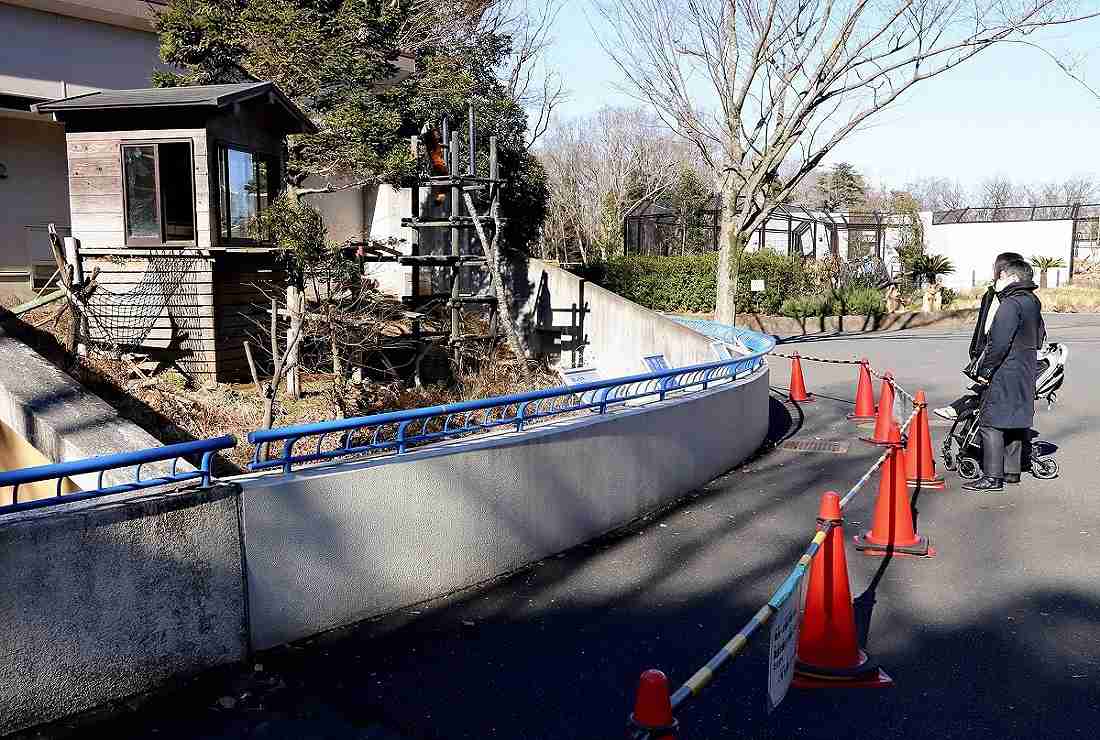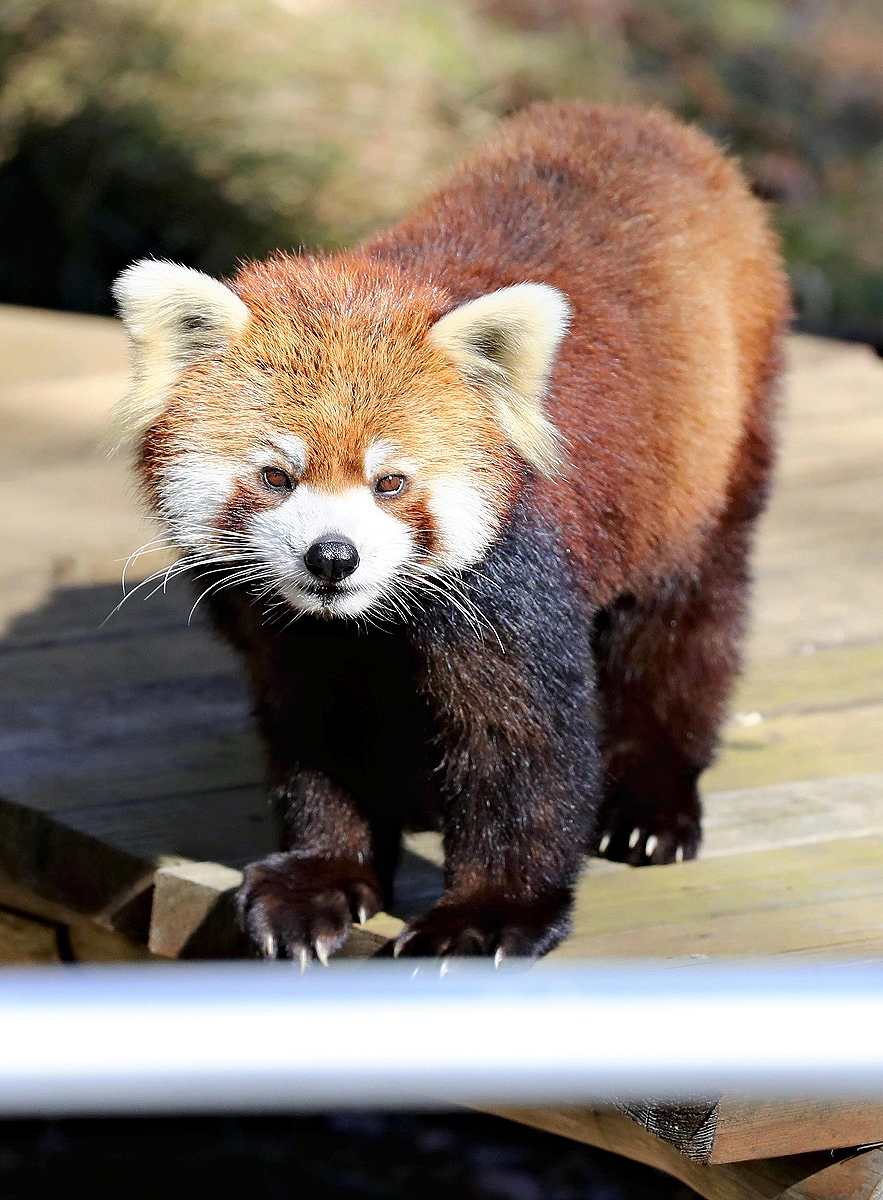
A cone barrier sits in front of the enclosure for red pandas to keep visitors at a distance at the Chiba Zoological Park in Chiba on Friday.
By Kazuma Sugimoto and Yuta Hirukawa / Yomiuri Shimbun Staff Writers
13:49 JST, February 7, 2021
Concerns about the spread of the coronavirus are not limited to people. Zoo operators across Japan have been on high alert to prevent their animals from being infected. Although no cases have been found at Japanese zoos so far, there have been infections confirmed overseas in gorillas, tigers and other animals that were suspected to have been transmitted from humans.
Looking to stay one step ahead of the virus, zoos are stepping up countermeasures, such as assuring that visitors view the animals from a distance. In the background of the added caution are memories of painful past experiences in which animals had to be euthanized after infectious diseases spread through the zoos.
■ No more petting
“It’s disappointing that visitors can’t see animals up close, but it can’t be helped,” Yoshiaki Kiyota, deputy director of the Chiba Zoological Park, said of the mixed feelings he has about countermeasures currently in effect at the zoo.
From March of last year, the zoo has implemented a series of measures in regard to seven species of animals, including orangutans, gorillas and red pandas. One such measure was to set up cone barriers about two meters from the animal enclosures to assure that visitors remain at a distance.
The zoo has also canceled events in which visitors can freely feed sheep, goats or other animals. All staff members are impelled to disinfect their shoes more thoroughly, and offices have been divided into three locations to reduce contact among zoo staff.
“As long as we have no way of knowing where the virus comes from, we can only do whatever is in our power,” Kiyota said.
At the Higashiyama Zoo and Botanical Gardens in Nagoya, known for its “handsome gorilla,” zookeepers are not only required to wear gloves and masks, but since March last year they must disinfect computers each time they use them and eat lunch in different locations.
“Gorillas and other animals close in species to humans may be more susceptible to infections, so we need to take stricter measures,” said Tetsuya Imanishi, 49, who is in charge of education outreach at the zoo. “We are making efforts to share information on infection cases and related matters.”
■ 24 countries, regions
According to the World Organization for Animal Health, coronavirus infection cases have been detected in animals, including dogs and cats kept as pets, in 24 of its 182 member countries and regions, including the United States and Japan, through the end of January. No infections have been confirmed at Japanese zoos, but there have been reports of lions, pumas and other animals contracting the virus at overseas zoos.
In April last year, a zoo in New York City announced that a tiger had tested positive for the virus. In another case, a gorilla at a California zoo became seriously ill after contracting the virus in January this year, but recovered after receiving the same antibody drugs used for former U.S. President Donald Trump when he was infected. In both cases, the infections were suspected to have been transmitted from zoo staff.
There are still many unknowns about coronavirus infections in animals. The World Organization for Animal Health has made public on its website such information as lists of infection cases and the animal species most susceptible to infection, as well as methods for disposing of carcasses.
■ No choice but euthanasia
The reason zoo operators in Japan have heightened their caution against the coronavirus is because of past experiences of struggling with infectious diseases.
Tennoji Zoo in Osaka was hit by an outbreak of tuberculosis in its monkey enclosure in 2004 and 2005. During the lengthy period of testing and treatment, six Japanese macaques died in succession, and the zoo had no choice but to euthanize the remaining 11 to prevent the spread of infection to staff and others. The infection was suspected to have been transmitted through food given to the primates by visitors.
Against the coronavirus, the zoo suspended feeding events for sheep and other animals in May last year, and required staff to wear masks and gloves to avoid touching animal food with their bare hands.
“Infectious diseases in animals are sometimes difficult to treat,” said Takakazu Imanishi, the zoo’s deputy director. “In the worst case scenario, we have to choose euthanasia.”
Zoos have also been hit with a series of bird flu outbreaks. In 2016, about 130 birds, including whooper swans, had to be euthanized at the Omoriyama Zoo in Akita City.
“It has been shown that infections can spread to the cat family and primates, which are the same as human beings,” said Tetsuya Mizutani, a professor of virology at the Tokyo University of Agriculture and Technology and an expert on infectious diseases in animals.
“In zoos, space is a problem and in some cases, isolation is difficult. Also, normal zoo operations can be disrupted as veterinarians and zoo staff deal with various situations, such anesthetizing animals to perform tests on them. It is crucial not to let the animals get infected in the first place.”

A red panda is seen at the zoo.
Most Read
Popular articles in the past 24 hours
-

Voters Using AI to Choose Candidates in Japan's Upcoming General ...
-

Japan's Snow-Clad Beauty: Camellia Flowers Seen in Winter Bloom a...
-

Monkey Strikes Junior High School Girl from Behind in Japan's Yam...
-

Genichiro Inokuma's Mural in Ueno Station That Gave Hope in Postw...
-

Senior Japanese Citizens Return to University to Gain Knowledge, ...
-

Heavy Snow Linked to 30 Deaths across Japan since Late Jan.; JMA ...
-

Tokyo Police Arrest Head of Resignation Assistance Firm
-

Foreign and Security Policy: Political Parties Must Discuss How T...
Popular articles in the past week
-

Japan Institute to Use Domestic Commercial Optical Lattice Clock ...
-

Australian Woman Dies After Mishap on Ski Lift in Nagano Prefectu...
-

Foreign Snowboarder in Serious Condition After Hanging in Midair ...
-

Chinese Embassy in Japan Reiterates Call for Chinese People to Re...
-

Narita Airport, Startup in Japan Demonstrate Machine to Compress ...
-

Toyota Motor Group Firm to Sell Clean Energy Greenhouses for Stra...
-

Sakie Yokota, Last Surviving Parent of a North Korea Abductee, Ur...
-

Beer Yeast Helps Save Labor, Water Use in Growing Rice; Govt Hope...
Popular articles in the past month
-

Univ. in Japan, Tokyo-Based Startup to Develop Satellite for Disa...
-

JAL, ANA Cancel Flights During 3-day Holiday Weekend due to Blizz...
-

China Confirmed to Be Operating Drilling Vessel Near Japan-China ...
-

China Eyes Rare Earth Foothold in Malaysia to Maintain Dominance,...
-

M6.2 Earthquake Hits Japan's Tottori, Shimane Prefectures; No Tsu...
-

Japan Institute to Use Domestic Commercial Optical Lattice Clock ...
-

Japan, Qatar Ministers Agree on Need for Stable Energy Supplies; ...
-

Japan, Italy to Boost LNG Cooperation; Aimed at Diversifying Japa...
Top Articles in Society
-

JAL, ANA Cancel Flights During 3-day Holiday Weekend due to Blizzard
-

Record-Breaking Snow Cripples Public Transport in Hokkaido; 7,000 People Stay Overnight at New Chitose Airport
-

Australian Woman Dies After Mishap on Ski Lift in Nagano Prefecture
-

Foreign Snowboarder in Serious Condition After Hanging in Midair from Chairlift in Nagano Prefecture
-

Train Services in Tokyo Resume Following Power Outage That Suspended Yamanote, Keihin-Tohoku Lines (Update 4)
JN ACCESS RANKING
-

Univ. in Japan, Tokyo-Based Startup to Develop Satellite for Disaster Prevention Measures, Bears
-

JAL, ANA Cancel Flights During 3-day Holiday Weekend due to Blizzard
-

China Confirmed to Be Operating Drilling Vessel Near Japan-China Median Line
-

China Eyes Rare Earth Foothold in Malaysia to Maintain Dominance, Counter Japan, U.S.
-

Japan Institute to Use Domestic Commercial Optical Lattice Clock to Set Japan Standard Time







